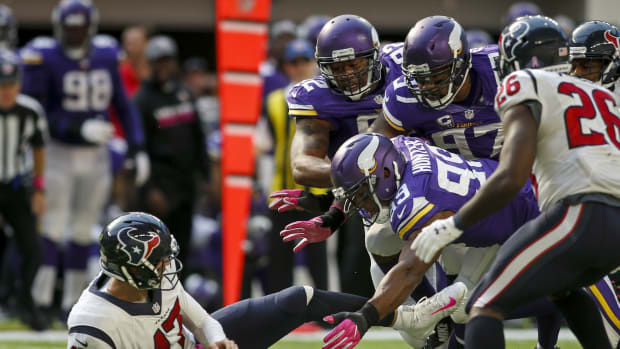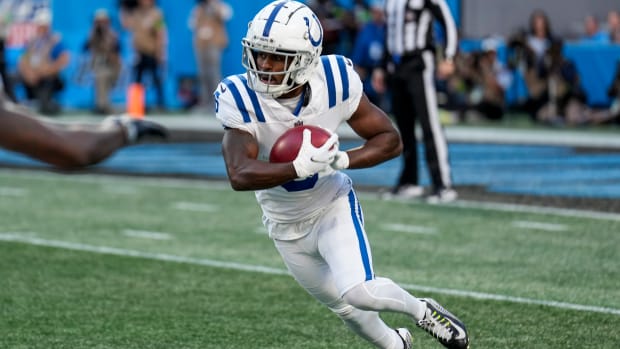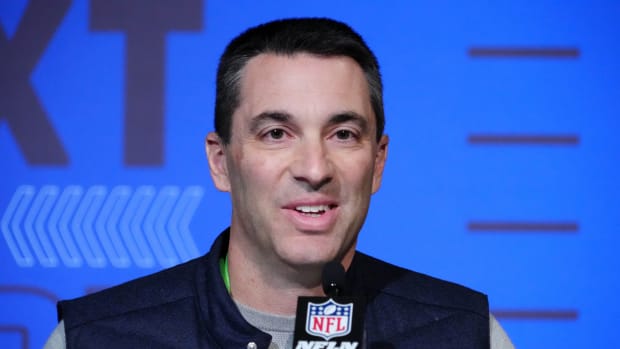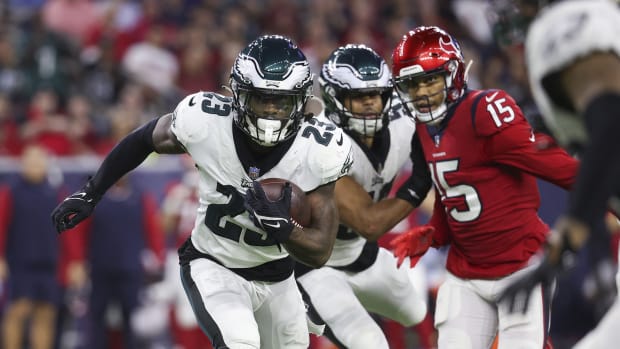Stanford Is the New Tight End U.
We determined each “Position U.” by measuring what every college should strive to do, in sports and beyond: Prepare students for professional careers. For the full explanation of our scoring system, scroll to the bottom of this article.
Amazingly, Stanford has never—not in the past decade, not ever—had a tight end selected in Round 1. But the Cardinal have had the most tight ends selected in the draft over the last decade (seven).
However, among the contenders for Tight End U., Miami and Iowa not only have more first-round pick(s) to their credit, but have put an All-Pro player into the league since 2010 (Jimmy Graham and George Kittle, respectively).
Tight end is the only position in the Position U. series without an SEC club in the Top 5, though there’s plenty of depth. Six of the Top 20 programs in our TE rankings came from the SEC, more than any other league.
* * *
WELCOME TO POSITION U.: Quarterback U. | Linebacker U. | Wide Receiver U. | Offensive Line U. | Running Back U. | Defensive Line U. | Defensive Back U.
* * *
TIGHT END U.: STANFORD
1. Stanford, 33 points
2. Miami, 30
3. Iowa, 29
4. Notre Dame, 26
5(tie). Oklahoma, 20
5(tie). USC, 20
7(tie). Arkansas, 16
7(tie). Penn State, 16
9(tie). Alabama, 14
9(tie). Wisconsin, 14
* * *
ALUMNI FOR TOP THREE
STANFORD
Zach Ertz (2013 second round, 71 starts)
Coby Fleener (2012 second round, 54 starts)
Austin Hooper (2016 third round, 28 starts)
Levine Toilolo (2013 fourth round, 67 starts)
Jim Dray (2010 seventh round, 38 starts)
Ryan Hewitt (2014 undrafted, 39 starts)
Dalton Schultz (2018 fourth round, 7 starts)
Kaden Smith (2019 sixth round, 6 starts)
Konrad Reuland (2011 undrafted, 4 starts)
MIAMI
Jimmy Graham (2010 third round, 111 starts, All-Pro)
David Njoku (2017 first round, 20 starts)
Clive Walford (2015 third round, 14 starts)
Chris Herndon (2018 fourth round, 12 starts)
Richard Gordon (2011 sixth round, 5 starts)
Erik Swope (2014 undrafted, 6 starts)
Asante Cleveland (2014 undrafted, 1 start)
Dedrick Epps (2010 seventh round)
Chase Ford (2012 undrafted, 5 starts)
IOWA
George Kittle (2017 fifth round, 37 starts, All-Pro)
T.J. Hockenson (2019 8th overall, 7 starts)
Noah Fant (2019 first round, 11 starts)
C.J. Fiedorowicz (2014 third round, 42 starts)
Tony Moeaki (2010 third round, 31 starts)
Allen Reisner (2011 undrafted, 3 starts)
Henry Krieger-Coble (2016 undrafted)
* * *
OUR SCORING SYSTEM
In order to make it modern, we used a 10-year data set. Dipping further back would mean going across different coaching eras at the college level, as well as including a lot of players who are no longer active in the NFL. (We did run an unofficial 20-year data set for the quarterback position, which you can read about at the bottom of this article.)
We came up with a scoring system that balanced not just the quantity of players programs put into the NFL, but the quality of those players' careers. One measure we used is draft position—an inexact but still relevant measure of a player's approximate value when he left college. We credited players for career games started. But rather than assigning a point value to every game started, which would weigh too heavily in favor of older players, we lessened that effect by using ranges.
We also awarded points for the highest achievements (MVP, and for non-quarterbacks, Offensive/Defensive Player of the Year and All-Pro) and awarded a smaller amount of credit for Rookie of the Year, an indication of a player's preparedness when entering the league. (We made the decision to exclude the Pro Bowl. Between fan voting and the league's need to dig deep into the pool of alternates with so many players dropping out annually, there's been a reduction in the legitimacy of that achievement.)
For all positions in this series, scoring is based on alumni who entered the NFL between 2010 and 2019 and were either (1) drafted or (2) undrafted but appeared in at least one game. Players who transferred during their college careers are counted only as part of the last program they played for. Players are only credited for the position at which they were drafted. Our full scoring system:
DRAFT POSITION
Top 10: 4 points
Round 1 (non-top 10): 3 points
Rounds 2-3: 2 points
Rounds 4-7: 1 point
Undrafted: 0 points
NFL GAMES STARTED
80-plus: 5 points
48 to 79: 4 points
16 to 47: 3 points
5 to 15: 2 points
1 to 4: 1 point
NFL AWARDS
Offensive Player of the Year: 4 points
First-Team All-Pro: 3 points
Offensive Rookie of the Year: 2 points
Research by Reid Foster and Gary Gramling.
• Question or comment? Email us.





































